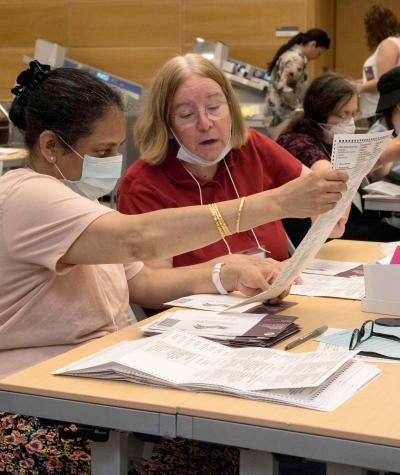Everyday Americans keep our elections fair — and they take this responsibility seriously. In recent years, however, individuals who have spent their careers safeguarding the electoral process are facing unprecedented levels of harassment and are leaving the profession in droves.
A recent poll reveals a high rate of turnover among election workers, equivalent to approximately one to two election workers quitting each day since the 2020 election.
States must take action to ensure that election workers can safely perform their jobs and continue to securely administer elections. Several states currently have laws that protect election workers, many of which were passed following the 2020 election. But not all legislation is created equal, and these laws vary significantly in how comprehensively they protect these everyday Americans from intimidation.
Most laws that protect election workers do so by creating criminal penalties for threats and harassment. Because some of these laws have been on the books for years, this category may cover only a subset of the threats election workers face today, namely assault or interference on election day itself.
But election workers face threats long before election day, such as during the early voting period, and long after as they work to prepare and count ballots and conduct recounts.
Laws passed more recently tend to include a wider range of behavior that can be harmful to election workers, covering actions such as coercion efforts that take place after election day.
These laws often also cover a longer period of time, including the post-election day period. In-state entities and advocates are often best equipped to determine what types of penalties will be the most effective deterrent of threats and harassment.
More recently proposed legislation, such as a bill passed in Minnesota this year, offers protection to election workers beyond criminal penalties by giving them the right to sue their harassers. This right is known as a civil right of action (or a private right of action).
Some of the broadest and most comprehensive legislation that protects election workers includes language that prohibits doxxing, which is the act of publicizing an individual’s personal information, typically on the internet.
States such as Colorado, Minnesota, Nevada and Oklahoma prohibit circulating certain types of personal information, such as an election worker’s home address, if the circulator knows or reasonably should know this will pose a threat to the election worker’s safety.
Perhaps the simplest, though also limited, way for states to protect election workers is for election workers to be included in information confidentiality programs.
Address confidentiality programs provide important protections for individuals whose personal addresses are being publicized and who are being threatened at home.
Many states already have address confidentiality programs in place for public employees such as judges and prosecutors. California, Colorado, Washington and Oregon are just a few examples of states that have incorporated state and local election workers into preexisting programs.
This approach does not fully address the myriad issues facing election workers today, however preexisting policy makes address confidentiality programs a relatively lighter lift for legislators, and they could be easily implemented to protect those who administer our elections.
Key components of robust election worker protection policy should include:
Imposing criminal penalties for harassing or threatening election workers.
Ensuring laws protecting election workers cover not just election day, but the critical days and weeks before and after the election.
Establishing a civil right of action for impacted election workers, which allows election workers to sue people who have violated their rights.
Protecting election workers from doxxing, which is the act of publicizing an individual’s personal information.
Securing confidentiality for information that could potentially identify a specific individual.
Election workers, from city and county clerks to poll workers, deserve to feel safe when doing their jobs. Our democracy suffers and loses a great deal of institutional knowledge when election workers leave the industry because of threats and harassment.
CLC is dedicated to supporting states as they pass and implement legislation to protect election workers from harmful threats and violence. It is incumbent upon states to take action to ensure that those who administer our elections can continue to do so without fearing for their own safety.

